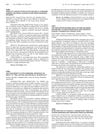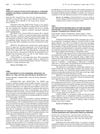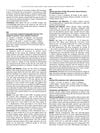 January 2016 in “International Journal of Medical Research and Health Sciences”
January 2016 in “International Journal of Medical Research and Health Sciences” Baldness (androgenic alopecia) could be a risk factor for prostate cancer.
[object Object]  August 2012 in “Expert Review of Dermatology”
August 2012 in “Expert Review of Dermatology” Men with early hair loss may have a higher risk of enlarged prostate and possibly prostate cancer due to shared hormonal factors.
 April 2012 in “The Journal of Urology”
April 2012 in “The Journal of Urology” Male pattern baldness may predict prostate cancer risk.
 April 2012 in “The Journal of Urology”
April 2012 in “The Journal of Urology” Eating more omega-3 and less omega-6 fatty acids may lower the risk of developing prostate cancer.
 April 2012 in “The Journal of Urology”
April 2012 in “The Journal of Urology” Patients with metabolic syndrome had lower Gleason scores when diagnosed with prostate cancer.
 March 2012 in “Dermatology Times E-News”
March 2012 in “Dermatology Times E-News” Men with pattern baldness may have a higher risk of prostate issues.
 February 2012 in “Expert Review of Endocrinology & Metabolism”
February 2012 in “Expert Review of Endocrinology & Metabolism” The document suggests more research is needed to understand the link between baldness and prostate cancer.
November 2011 in “InTech eBooks” Prostate cancer risk is not linked to blood testosterone levels.
 September 2011 in “Cancer”
September 2011 in “Cancer” Men who start losing hair at 20 may have a higher chance of getting prostate cancer later.
 March 2011 in “European Urology Supplements”
March 2011 in “European Urology Supplements” Blood tests for tumor cells could improve prostate cancer diagnosis and treatment; hair loss severity linked to a gene affecting prostate conditions.
[object Object]  March 2011 in “European Urology Supplements”
March 2011 in “European Urology Supplements” CEC levels may be a useful marker for predicting prostate cancer progression.
 October 2010 in “Journal of Men's Health”
October 2010 in “Journal of Men's Health” Larger prostate size in older men may be linked to poorer semen quality and fertility issues.
 September 2010 in “European Urology Supplements”
September 2010 in “European Urology Supplements” Opioid use may lower PSA levels, suggesting a possible role in prostate cancer control; PSA testing is useful for detecting prostate cancer; serum triglycerides are not linked to prostate cancer risk; and higher urethral PSA levels may be associated with local hormone activity.
 September 2010 in “European Urology Supplements”
September 2010 in “European Urology Supplements” The document does not confirm if radical prostatectomy is the best treatment for locally advanced prostate cancer.
 September 2009 in “European Urology Supplements”
September 2009 in “European Urology Supplements” Surgery for high-risk prostate cancer is challenging but doesn't lead to more complications, and additional treatment is often needed.
 October 2008 in “The Journal of Urology”
October 2008 in “The Journal of Urology” Finasteride reduces prostate cancer risk but may increase high-grade tumors and has side effects; biopsy methods have similar outcomes; psychosocial factors affect sexual recovery post-surgery.
 August 2008 in “Current Opinion in Internal Medicine”
August 2008 in “Current Opinion in Internal Medicine” In 2007, prostate cancer research improved understanding of risk, diagnosis, and treatment, but also showed heart risks with certain therapies and the need for personalized care.
 February 2007 in “Faculty Opinions – Post-Publication Peer Review of the Biomedical Literature”
February 2007 in “Faculty Opinions – Post-Publication Peer Review of the Biomedical Literature” Taking 1mg of finasteride daily for hair loss can lower PSA levels by 40-50%, so to keep PSA effective as a cancer screening tool, the PSA value should be doubled during treatment.
 June 2006 in “American Journal of Epidemiology”
June 2006 in “American Journal of Epidemiology” Long-term diabetes is linked to lower prostate cancer risk.
 June 2006 in “American Journal of Epidemiology”
June 2006 in “American Journal of Epidemiology” Higher BMI is linked to a lower risk of non-aggressive prostate cancer and a higher risk of aggressive prostate cancer.
 November 2005 in “The Journal of Urology”
November 2005 in “The Journal of Urology” Dutasteride may lower the chance of finding prostate cancer in men with enlarged prostates.
January 2021 in “HAMDAN MEDICAL JOURNAL” Finasteride treats hair loss and reduces prostate cancer risk.
September 2019 in “Human Andrology” Higher serum androgens contribute to male pattern baldness.
 August 2019 in “Journal of The American Academy of Dermatology”
August 2019 in “Journal of The American Academy of Dermatology” No link found between hair loss severity and PSA levels in men.
January 2018 in “프로그램북(구 초록집)” No link between hair loss severity and PSA levels in men.

Hair loss at the top of the head is linked to prostate cancer, but other types of hair loss are not.
 April 2012 in “The Journal of Urology”
April 2012 in “The Journal of Urology” Early baldness increases prostate cancer risk, radiotherapy and surgery have similar second cancer rates, and ALA may reduce prostate cancer risk.
 March 2011 in “European Urology Supplements”
March 2011 in “European Urology Supplements” Gene variation affects prostate issues and hair loss.
 January 2008 in “The Year book of endocrinology”
January 2008 in “The Year book of endocrinology” Gene variant linked to prostate cancer, hormone levels, and hair loss.
 October 2005 in “Archives of Dermatological Research”
October 2005 in “Archives of Dermatological Research” Large prostate patients more likely to have hair loss.


























